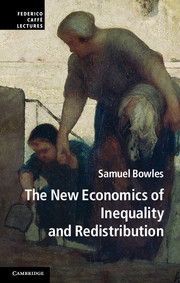Book contents
- Frontmatter
- Contents
- Illustrations
- Preface
- 1 The new economics of inequality and redistribution
- 2 The economic cost of wealth inequality
- 3 Feasible egalitarianism in a competitive world
- 4 Globalization, cultural standardization, and the politics of social insurance
- 5 Reciprocity, altruism, and the politics of redistribution
- 6 Conclusion
- Appendices
- Works cited
- Index
4 - Globalization, cultural standardization, and the politics of social insurance
Published online by Cambridge University Press: 05 February 2013
- Frontmatter
- Contents
- Illustrations
- Preface
- 1 The new economics of inequality and redistribution
- 2 The economic cost of wealth inequality
- 3 Feasible egalitarianism in a competitive world
- 4 Globalization, cultural standardization, and the politics of social insurance
- 5 Reciprocity, altruism, and the politics of redistribution
- 6 Conclusion
- Appendices
- Works cited
- Index
Summary
Benjamin Disraeli’s “two nations . . . between whom there was no intercourse and no sympathy” were the rich and the poor. It was 1845, the same year that Frederick Engels wrote the explosive The Condition of the Working Class in England. Since then in the advanced economies, a combination of nationalism, representative democracy, and the resulting policies of universal public education and egalitarian redistribution have bridged the cultural and economic gap considerably. The rich and the poor are still with us of course, and on a global scale the economic gap between them is far greater than when Disraeli wrote (Bourguignon and Morrison 2002). But in the richer economies the nations of Disraeli’s world (and Engels’) have been left behind.
Globalization, Ugo Pagano and I maintain, is an extension of nationalism, not its antithesis: it promotes cultural standardization and economic integration across national boundaries. But unlike nationalism, which in many countries had a democratic twin, globalization standardizes and integrates without providing either the international cultural solidarity or governmental institutions capable of supporting egalitarian redistribution and insurance on a global scale, while weakening some of the nation-based institutions for the same. In this respect a globalized world may re-create the social structure of the archetypal ancient agrarian empire: a dominant class of cosmopolitans speaking a common language (once French in many parts of Europe, Persian in Mughal India, Ottoman Turkish in the Ottoman empire, today English everywhere) and presiding over a heterogeneous and provincial underclass speaking a Babel of dialects, with little solidarity across the language groups, and weak nationally based instruments of social insurance and egalitarian redistribution.
- Type
- Chapter
- Information
- The New Economics of Inequality and Redistribution , pp. 101 - 130Publisher: Cambridge University PressPrint publication year: 2012



